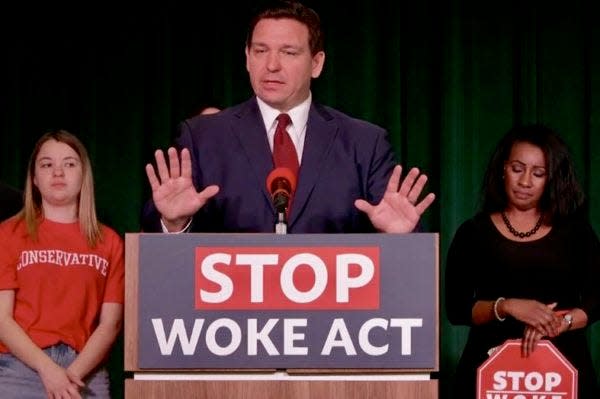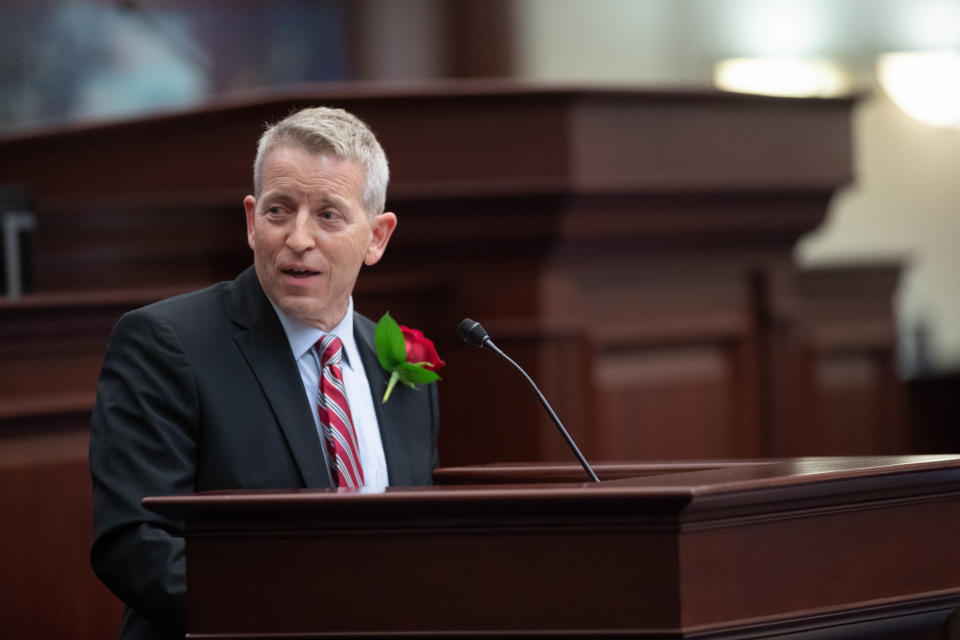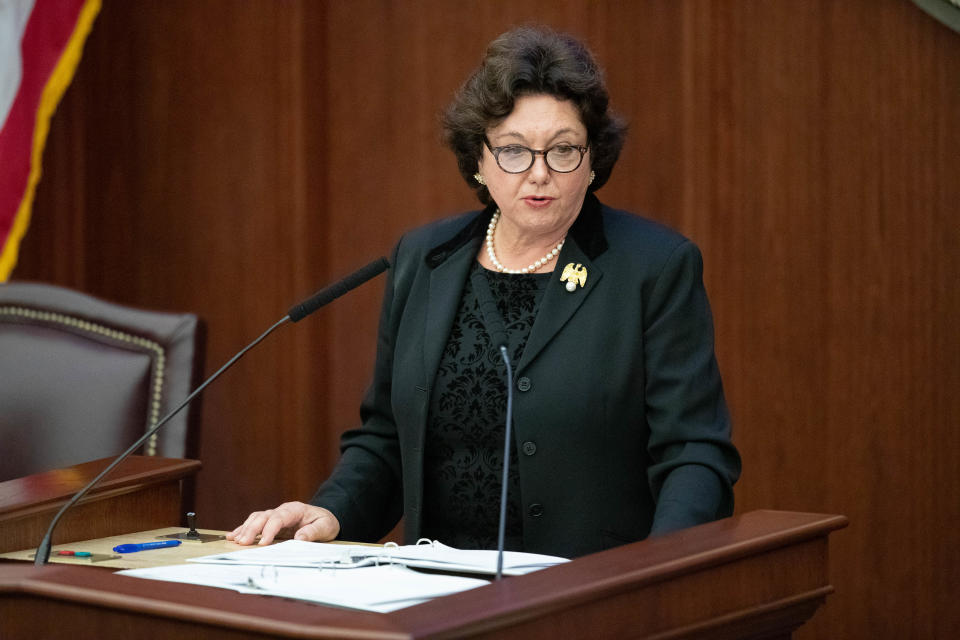After $22B loss, state workers pension system rebounding, facing new investing restrictions
- Oops!Something went wrong.Please try again later.
Managers for the state-backed pension fund have new rules to follow when investing money to pay retirement benefits for a million government workers, retirees, and their survivors that critics say could prove costly to taxpayers.
Last week, Gov. Ron DeSantis and CFO Jimmy Patronis, and Attorney General Ashley Moody, as the State Board of Administration, adopted a policy statement to prohibit consideration of “social, political or ideological interest,” when investing state money.
The SBA manages the Florida Retirement System’s (FRS) $180 billion fund, which backs the pension plan for public school teachers, firefighters, and other state and local government employees.
Stakeholder Capitalism and Corporate Governance

DeSantis and Patronis are outspoken critics of so-called environmental, social corporate governance (ESG). That's when companies factor in climate change and other societal concerns into investment decisions.
They see it as a threat to U.S. security equal to the one posed by China and pledge to make anti-ESG legislation a priority when the Florida Legislature meets in session in March.
ESG is a 20-year-old stakeholder capitalism movement grounded in the United Nation’s Principles for Responsible Investing. Major investment firms like BlackRock, Vanguard, and State Street signed the statement and collectively manage more than $22 trillion in assets.
Florida has $338,000 in a State Street account, and more than $2 billion with BlackRock, whose CEO is a leading defender of ESG. In December, Florida said it would freeze about $1.43 billion worth of long-term securities and remove BlackRock as the manager of about $600 million worth of short-term overnight investments with the goal of giving that business to other money managers by the beginning of 2023.

“Stakeholder capitalism is not about politics. It is not a social or ideological agenda. It is not woke,” wrote Fink in an open letter last year to CEOs about ESG and BlackRock.
Florida labor unions say proposal will lead to 'disaster' for state worker pensions
'Here we go again': Florida lawmakers try again to cut new state workers off from pension plan
State pension fund finances 'headed in right direction' — but not quite there yet
Supporters say ESG steers investment in a socially conscious direction to combat ills such as pollution and poverty that impact investors and consumers. Companies are rated on adherence to ESG-friendly policies.
Critics dismiss it as a public relations stunt that raises the cost of capital for business.
Next stop: Legislature
“We need asset managers to be laser focused on returns and nothing more. Florida’s not going to subsidize the actions of Leftist ideologues who hate America; we’re not going to let a bunch of rich people in Manhattan or Europe circumvent our democracy,” said Patronis.

Florida House Speaker Paul Renner fully supports the anti-ESG initiative, while Senate President Kathleen Passidomo said she looks forward to the discussion.
“We will require the state’s pension fund to forgo the woke dogma of the ESG movement and focus on protecting workers’ retirement funds,” wrote Renner in an opinion piece distributed to state newspapers.
Passidomo said ESG “adds another layer” to the process of making money, which she finds troubling.

“If they are truly in the business to make money, then that's what they should be doing,“ said Passidomo, about investment firms.
Sen. Ed Hooper, R-Clearwater, has filed a bill that would put into law a requirement for State Board of Administration evaluations to be based solely on “pecuniary factors.”
But business leaders, academics, FRS members, and labor leaders all said at best the initiative is misguided.
Mark McNees, a professor at Florida State University’s Jim Moran College of Entrepreneurship, founded Tallahassee’s RedEye Coffee on ESG principles and penned a column declaring ESG is “market-driven, not social engineering.”
McNees describes himself as a die-hard capitalist who finds it a “strange platform” for a political party that has supported free-market, small-government principles since the end of World II to now advocate the use of “the power of government to control” companies.

“These incredibly profitable companies aim to maximize profits and minimize risk, not participate in social engineering. That plan is market-driven which is why they have adopted a environmental, social, and governance (ESG) strategy in response to what I call the Responsibility Revolution,” wrote McNeese in a Tallahassee Democrat My View column.
University of Central Florida political scientist Aubrey Jewett notes DeSantis and Patronis overheated rhetoric about leftists and threats to America follows a pattern displayed in previous cultural war battles over parental rights in public schools and the teaching of critical race theory.
Jewett said DeSantis is a “master” of political spin in how he promotes policies that accomplish the opposite of the stated goal.
“They are pushing these things at the expense of FRS. When they pull out of BlackRock, which has returns better than many of the other investments that Florida is in; it’s sort of like you cost FRS money here, buddy, and taxpayers potentially, too,” said Jewett.
Where the Florida Retirement System stands
The FRS fund lost $21.9 billion (6.2%) on Wall Street last year, according to a Department of Management Services audit.
The FRS strives to earn a return on investment of 4% plus the rate of inflation, which would have been 13% in the 2021 –2022 fiscal year but missed its mark in a market roiled by war in Europe, inflation and COVID-induced supply chain bottlenecks.
All but six of the 228 government-back pension funds in the non-profit pension watchdog Equable Institute annual report lost money last year when the S&P 500, the largest companies on the stock exchange, closed out 2022 down 20% - the worst performance since the Great Recession.
It was the first time in 13 years the state investment strategy failed to hit its mark and came on the heels of a record-breaking return of 29% in 2021.
The DMS audit finds FRS has enough money to pay 82% of promised benefits to the 448,846 seniors now collecting and to the 629,073 workers who are currently contributing to the fund, in the event if all those working retired today.
Many industry experts consider a ratio of assets to obligations of 80% to be adequate and a sign of a healthy pension plan.
The gap between assets and obligations is known as an unfunded liability and has been used as an argument by some lawmakers to push to privatize or implement other reforms for the FRS.
The current unfunded liability totals $38 billion.
Auditors found if FRS hits its investment targets over the next 15 years the unfunded liability reaches zero. If the investment strategy underperforms by a half-percentage point then the unfunded liability will begin to decrease in 2032.
The SBA has failed to hit its inflation-plus 4% target just five times since 1996 - the two years after the September 11 attack (2001, 2002), during the Great Recession (2008, 2009), and in 2022.
Given that performance, the AFL-CIO's Rich Templin said politicians using FRS money as a weapon against ESG are violating their responsibility as the fund's custodians and their fiduciary responsibility to taxpayers and workers.
“The Florida Retirement System is not something to be used to make political statements. It is not bait for political headlines,” said Templin.
The AFL-CIO coalition of labor unions includes AFSCME and the Florida Education Association, which together represents more than 100,000 working members.
“They have one responsibility that overrides all of their other concerns – and that is to make money. To pull Florida out of successful money-making investments shows they will use anything as a political prop,” said Templin.
After closing out last year with a loss, the fund is starting 2023 in the black,.
SBA interim executive director Lamar Taylor told DeSantis, Patronis, and Moody last week the fund is up 3.8%.
Taylor explained the trend may be more positive than the numbers indicate because data has been hampered by a lag in response by private investment to market conditions.
“We believe they will reverse course later in the year and get performance back in line,” said Taylor.
And as the market continues its correction, Taylor has new marching orders from his bosses. He is to disregard elements of the state’s investment strategy that has produced returns above inflation-plus 4% over the last 10, 25, and 30 years.
Florida will now avoid investments in companies that follow environmental, social corporate governance policies and may even pull more funds from investment firms that do so.
James Call is a member of the USA TODAY NETWORK-Florida Capital Bureau. He can be reached at jcall@tallahassee.com. Follow on him Twitter: @CallTallahasse
This article originally appeared on Tallahassee Democrat: After $22B loss, Florida pension system faces new ESG restrictions

